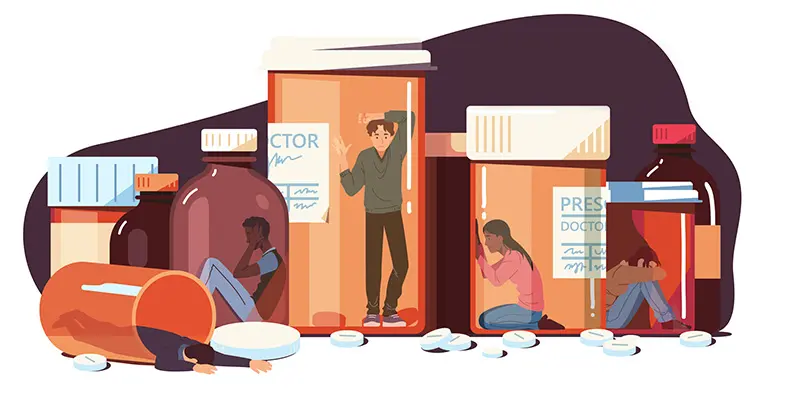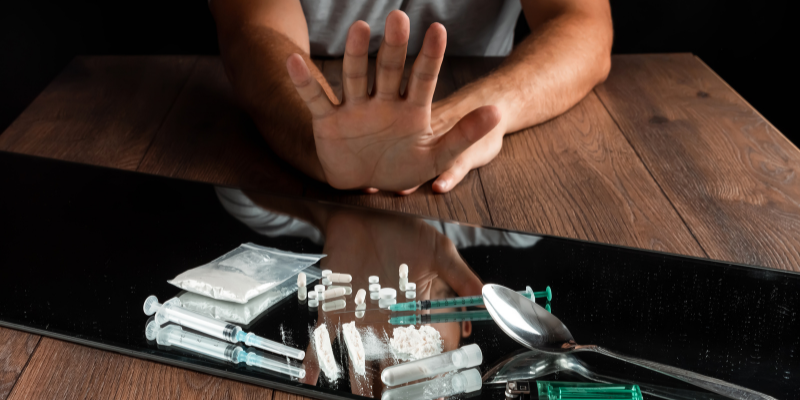
Are you struggling with an unhealthy relationship with alcohol, prescription medications, or street drugs? Most likely, you assume your addiction is due to weakness, a character flaw, or a lack of self-control. This is not surprising, considering this is probably the overarching message you’re hearing from your friends and family.
“Why are you such a screw-up?”
“Why are you always letting me down?”
“Why can’t you be more reliable?”
When you finally make the decision to seek help for a drinking or drug use problem, you probably feel like you’ve let yourself down and let your loved ones down too. Even worse, you may believe it’s your fault or that you deserve a life of misery. Brain imaging changes these inaccurate and harmful beliefs.
If you’re struggling with addiction, you may believe it’s your fault or that you deserve a life of misery. Brain imaging changes these inaccurate and harmful beliefs. Click To TweetWHAT BRAIN IMAGING SHOWS ABOUT ADDICTION
In working with thousands of substance abusers, we have found that brain SPECT imaging helps people realize that addiction is clearly a brain disease, not the result of a character flaw or personal weakness that can never be treated. SPECT is a brain imaging technology that measures blood flow and activity in the brain. It shows areas of the brain with healthy activity, too little activity, and too much activity.
Brain imaging helps people to think of addiction in the same way you would think of any other disease. Take diabetes, for example, which is a disease of the pancreas that leads to problems with insulin and blood sugar. Diabetes can lead to medical and behavioral consequences. With the proper treatment, it can often be controlled so that diabetics can live a satisfying life.
Similarly, addiction is a disease that can lead to problems with physical health and behavioral issues. With a brain-based approach to treatment, addiction can often be controlled so you can regain control of your life.
HOW BRAIN IMAGING HELPS ALLEVIATE ADDICTION STIGMA
Realizing that addiction is a brain disease can be very powerful because it alleviates some of the stigma attached to substance abuse and bad behaviors. No longer do you have to feel like you’re a bad person for having addictions or that the questionable behaviors you engage in while high or drunk define who you are as a person.
Take Nadine, 17, for example. When this teenager entered a drug program, she admitted that she felt like a loser because she would get drunk and then have sex with anyone. She was quick to label herself by saying, “I’m a slut.” But when she was asked if she was also promiscuous when she was sober, she said no. She had never had sex with anyone when she was sober.
After looking at SPECT scans of brains damaged by alcohol and drug use compared to healthy brains, Nadine began to understand that her problems were not due to a character flaw, but to a brain problem. This helped her stop thinking of herself in such a negative and damaging way and gave her hope that she could change.
BRAIN IMAGING INCREASES UNDERSTANDING AND FORGIVENESS IN FAMILIES
Realizing that addiction and substance abuse are brain diseases can also help parents understand that it isn’t your fault if your child has an addiction. Including the entire family in treatment plans is important. Many parents of substance abusers mercilessly beat themselves up over their child’s problems.
“If only I had taken him to that Giants baseball game when he was seven instead of working, this wouldn’t have happened. It’s all my fault.”
“If I had paid more attention to who she was hanging around with, I could have prevented this.”
“I should have made him transfer to another school.”
Parents often play the blame game with each other too.
“If you would have been home more often, you would have seen what was happening.”
“You were always too lenient with her, letting her do whatever she wanted.”
“You were so strict, you alienated him.”
These thinking patterns are so detrimental to treatment and recovery. By contrast, focusing on addiction as a brain disease helps the entire family look at the brain as the organ that needs to be treated in order for the person with the addiction to get better.
Note that the concept of addiction as a brain disease does not relieve you of taking responsibility for your actions and behaviors. It gives you a better understanding of how your brain plays the central role in your addiction and how taking care of your brain is the key to breaking free from those addictions and behaviors.
BRAIN IMAGING HELPS IDENTIFY COMORBID CONDITIONS
People with addictions often have co-existing conditions, such as anxiety, depression, posttraumatic stress disorder (PTSD), and ADD/ADHD. Brain imaging helps identify these co-occurring disorders, as well as past head injuries, which are also associated with increased risk for addictions.
We once treated a 42-year-old woman who had failed 6 alcohol treatment programs. She desperately wanted to stop drinking alcohol, but she couldn’t follow through with any of the programs because she was so impulsive. She just couldn’t say no whenever alcohol was around.
Her brain scans showed severe damage to the prefrontal cortex (PFC)—a brain region involved in impulse control, judgment, and learning from one’s mistakes—due to a head injury. It turned out that she had been kicked in the head by a horse when she was 10 years old. She had no supervisor in her head.
The PFC acts like the brain’s brake, telling you to stop before engaging in detrimental behaviors. Without this internal supervisor, she constantly gave in to her cravings for alcohol. If we didn’t address the damaged PFC, she would never be able to recover. Giving her a treatment plan to enhance PFC function was very helpful to her and allowed her to follow through on an alcohol treatment program.
Comorbid conditions, such as anxiety, depression, PTSD, ADD/ADHD, or head injuries, all need to be treated in addition to treating the addiction. You can have the greatest addiction treatment plan available or enter the most well-respected treatment center, but if you have underlying brain dysfunction, chances are you won’t be able to follow through with the program. For lasting success, the brain problems must be treated in addition to the addiction.
BRAIN IMAGING HELPS SHOW PROGRESS
There is no better way to find out if a treatment program is working than to see before-and-after images of the brain. Scans clearly show when a treatment plan is effectively healing the brain or when it needs to be adjusted. Thanks to imaging, small adjustments can be made to a person’s program to promote even faster healing, so it will be easier for you to break free from the addictions that steal your life.
For patients, seeing the progress they have made can be a tremendous motivator to continue on the road to freedom from addiction. Even the slightest improvements in brain health can encourage you to stay on the right track.
Substance abuse disorders, alcohol use disorders, and other mental health issues can’t wait. At Amen Clinics, we’re here for you. We offer in-clinic brain scanning and appointments, as well as mental telehealth, clinical evaluations, and therapy for adults, teens, children, and couples. Find out more by speaking to a specialist today at 888-288-9834 or visit our contact page here.





What kind of treatment is available for someone who is diagnosed a brain dysfunction?
Comment by Kelly — February 17, 2023 @ 3:21 AM
Is there anywhere in the UK where I can get a SPECT scan prior to having treatment with you?
Comment by Louise Morgan — February 17, 2023 @ 3:36 AM
Very helpful, clear, concise information. I wish I had had the information before my son passed away at 40 January of 2021.
Comment by Patricia — February 17, 2023 @ 3:41 AM
I am disappointed that you did not include food or shopping addictions in this article. I have struggled with obesity my entire life. I always felt it was brain based . Recently I became prediabetic and was prescribed Ozempic. What a miracle drug for me! My cravings, my food obsession and my appetite are gone. I finally feel like a normal person. I would love to see a study on how this drug.affects brain function. Obesity is a disease not a flaw in one’s character. The medical community needs to acknowledge this and stop shaming those of us that struggle with it. As alway thank you for the wonderful work you do
Comment by Martha — February 17, 2023 @ 4:21 AM
How can you help someone who doesnt have insurance
Comment by Jimmy — February 17, 2023 @ 4:29 AM
I am thinking of heading to Vancouver with my 19 year old son and considering the brain scan and analysis for us both. Is there a long wait list at the moment ?
Comment by Heather MacLellan — February 17, 2023 @ 5:04 AM
I read all of these things like this and would love to seek the benefits but the fact that insurance doesn’t cover is crazy! I just think about how much insurance has paid in therapy bills for me over the years and it could’ve just covered this and we possibly could be good🤷♂️
Comment by Tony — February 17, 2023 @ 5:20 AM
I want to do a spect exam how much does it cost
Comment by Kelly — February 17, 2023 @ 5:38 AM
Can this also include gambling addiction?
Comment by Kathy Harrington — February 17, 2023 @ 5:40 AM
When will those of us who use sugar and sweet products to calm, soothe and comfort ourselves be included and help emotional help be offered to us. The use of sugar products has become a national epidemic. Please respond
Thank you Dr Amen
Comment by Ernestine Morrison — February 17, 2023 @ 6:58 AM
Our son was diagnosed "bipolar" when he was in his 20's. In college he started playing poker with roommates, He developed an addiction to gambling. Do you think that his "bipolar" diagnosis had something to do with his gambling addiction? It's very hard to find help for this also. The experts just diagnosed him and prescribed drugs for "bipolar. Thank you for your response.
Comment by Lynn — February 17, 2023 @ 10:29 AM
Would like to know more about the brain 🧠 activity
Comment by Christina Riley — February 17, 2023 @ 11:05 AM
Dr Amen – I would be so grateful if you would write about the addiction of gambling. Is this also a lack of impulse control in the prefrontal cortex? there seem to be so many treatment programs for alcohol and drug addictions, but no one speaks to the addiction of gambling. Thousands of lives are ruined each year by those who gamble – either because they take from others to support their addiction or they eventually hurt themselves. I want to help someone I love but I feel helpless and don’t know where to begin!?!
Comment by Annie — February 19, 2023 @ 8:56 PM
Hello Christina, thank you for reaching out. For more information about SPECT scans and our services, please contact our Care Coordinators: https://www.amenclinics.com/schedule-visit/.
Comment by Amen Clinics — February 28, 2023 @ 12:07 PM
Hello Kelly, thank you for reaching out. For more information about SPECT scans and our services, please contact our Care Coordinators: https://www.amenclinics.com/schedule-visit/
Comment by Amen Clinics — February 28, 2023 @ 1:02 PM
Hello Heather, thank you for reaching out. For more information about SPECT scans and our services, please contact our Care Coordinators: https://www.amenclinics.com/schedule-visit/
Comment by Amen Clinics — February 28, 2023 @ 1:03 PM
Hello Louise, thank you for reaching out. For more information about SPECT scans internationally and consults with our Amen Clinics physicians, please contact our Care Coordinators: https://www.amenclinics.com/schedule-visit/
Comment by Amen Clinics — February 28, 2023 @ 6:37 PM
Hello Kelly, thank you for reaching out. For more information about SPECT scans and our services, please contact our Care Coordinators: https://www.amenclinics.com/schedule-visit/.
Comment by Amen Clinics — February 28, 2023 @ 6:39 PM